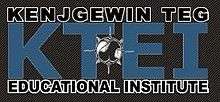Kenjgewin Teg Educational Institute
Kenjgewin Teg Educational Institute (KTEI) is an Aboriginal-owned and controlled post-secondary institution at M'Chigeeng First Nation, on Mnidoo Mnising Manitoulin Island, Ontario, Canada. In the Ojibwe language, Kenjgewin Teg means a place of knowledge. KTEI provides educational initiatives to its member population of 6,800+ people and to students in the surrounding area. Programs are offered to its eight-member First Nations:
- Aundeck-Omni-Kaning First Nation
- Constance Lake First Nation,
- M'Chigeeng First Nation
- Sagamok First Nation.
- Sheguiandah First Nation
- Sheshegwaning First Nation
- Whitefish River First Nation
- Zhiibaahaasing First Nation
 | |
| Motto | "A Place of Learning" |
|---|---|
| Type | Aboriginal-owned and controlled post-secondary institution. |
| Established | 1994 |
| President | Stephanie Roy |
| Undergraduates | university, and continuing education students |
| Location | M'Chigeeng First Nation, Mnidoo Mnising Manitoulin Island , , Canada P0P 1G0 |
| Campus | reserve |
| Affiliations | United Chiefs and Councils of Manitoulin, Indian & Northern Affairs Canada, and the Ontario Ministry of Education, |
| Mascot | Living, learning, inviting opportunities |
| Website | ktei.net |
Aboriginal institutes partner with colleges and universities to offer students degree programs, apprenticeships, certificate programs and diploma programs. KTEI was founded to provide greater access to post-secondary education for Aboriginal peoples. KTEI delivers post-secondary programs approved by the Ministry of Training, Colleges and Universities. The educational curriculum was adapted to meet the needs of Aboriginal learners to ensure it reflects community needs, cultural heritage and identity. KTEI offers student support services and an Elder-in-Residence program.
History
In April 1994 the Wautebek Training Institute and Nda-Gkenjge-Gamig Educational Institute merged to create the Kenjgewin Teg Educational Institute (KTEI). Since 1994, KTEI has offered college and university programs through articulation agreements with public colleges and universities. KTEI developed Joint Management Committees with the affiliated educational institutions. Although KTEI began with five (5) staff, today KTEI employs 18+ personnel, plus contractual staff.
Mission
Kenjgewin Teg mission
- to provide an Anishinabewin community based-approach to education, training and business support services and opportunities.
- to provide quality educational programs and services which are academically, geographically, financially, technologically, and physically accessible
- to meet the educational and training needs of a unique population, and the organizations within our communities
Partnerships
| Indigenous peoples in Canada |
|---|
|
|
History
|
|
Politics
|
|
Culture
|
|
Demographics
|
|
Religions |
|
Index
|
|
Wikiprojects Portals
WikiProject
First Nations Inuit Métis |
KTEI offers programs and courses of study in partnership with all levels of government; commissions; industries; commerce and other education and training institutions.
Programs offered
Kenjgewin Teg provides direct educational services. Training and professional development courses are delivered to Aboriginal or non-Aboriginal community, organization, association, or groups.
- college and university accredited programs,
- pre-employment training programs,
- school support services,
- organizational development,
- employee training, professional development workshops,
- small business learning, and
- general interest learning.
University
- Azhiitawin University Transitions Program
- Aboriginal Teacher (ATEP) Education Program, Queens' University
- Bachelor of Social Work, Native Human Services, Laurentian University
College
- Anishnaabemowin Immersion Program, Sault College of Applied Arts and Technology
- Academic and Career Entrance Program, Cambrian College of Applied Arts and Technology
- Personal Support Worker (1 Year), Cambrian College of Applied Arts and Technology
- Binoojiinyag Kinoomaadwin: Early childhood educator, (2 Years) Cambrian College of Applied Arts and Technology
Continuing Education
- Workshops & Seminars
- Anishinabek Identity, Mind and Spirit (A.I.M.S.) Essential Skills and Job Readiness
Scholarships & Bursaries
The Government of Canada sponsors an Aboriginal Bursaries Search Tool that lists over 680 scholarships, bursaries, and other incentives offered by governments, universities, and industry to support Aboriginal post-secondary participation. KTEI scholarships for Aboriginal, First Nations and Métis students include: [1]
References
| Wikimedia Commons has media related to Kenjgewin Teg Educational Institute. |